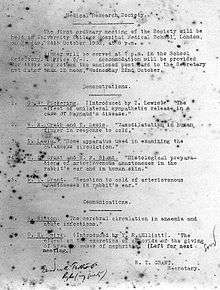Medical Research Society
The Medical Research Society (MRS) was founded by Sir Thomas Lewis in 1930. The Society was 'instituted for the purpose of advancing knowledge of the causes and processes of disease, by clinical or related experimental studies in man’.[1] The MRS published the journal Clinical Science from 1945 until 1961, and then jointly with the Biochemical Society until 2003.[2][3] The MRS continued to hold regular research meetings until October 2011 when it merged with the Academy of Medical Sciences.[4] The Academy of Medical Sciences now awards an annual Medical Research Society prize for pre-PhD (Foundation Year doctors and Academic Clinical Fellows) and PhD students.[5]

History
The MRS was formed following a report by a subcommittee of the UK Medical Research Council on the ‘Future Policy for the Promotion of Clinical Research’.[1] The report was written by Lewis, Thomas Renton Elliott, Wilfred Trotter and John Parsons. The first meeting of the Society was held on 24 October at University College Hospital.[1] At its formation the Society had 18 ordinary members and 2 honorary members, Archibald Garrod and John Scott Haldane.[6] The first demonstration at the first meeting was on 'The effect of unilateral sympathetic release in a case of Raynaud's disease' by George Pickering.[6]
References
- Pochin, E. E. (1981-09-01). "Early Days of the Medical Research Society". Clinical Science. 61 (3): 357–360. doi:10.1042/cs0610357. ISSN 0143-5221. PMID 7021047.
- NLM Catalog: Clinical Science ([1] search term: "0367732[NlmId]") (accessed 24 October 2007)
- Turner AJ. Portland Press Limited: the year 2003 in review The Biochemist (August 2004) (accessed 13 October 2007)
- Hodgson, Humphrey (2016-06-01). "Clinician scientists in training". Clinical Medicine. 16 (3): 211–212. doi:10.7861/clinmedicine.16-3-211. ISSN 1470-2118. PMC 5922695. PMID 27251906.
- "Competitions | The Academy of Medical Sciences". acmedsci.ac.uk. Retrieved 2017-05-01.
- Hoffenberg, R. (1981-09-01). "Fiftieth anniversary. Medical Research Society. Introduction by the Chairman". Clinical Science. 61 (3): 355–356. doi:10.1042/cs0610353. ISSN 0143-5221. PMID 7021046.